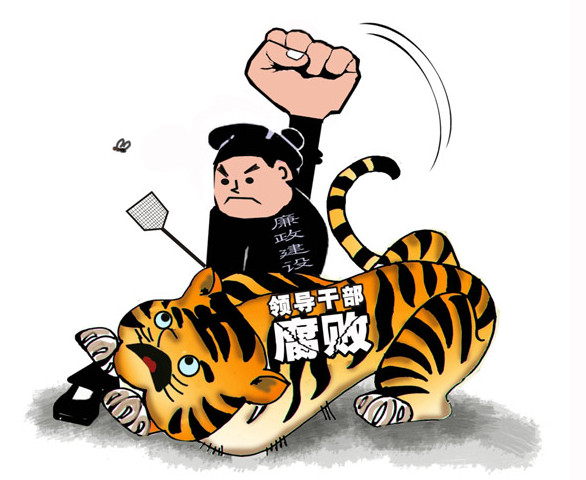Restraint on power key in curbing corruption
Updated: 2013-01-23 19:50
(Xinhua)
|
||||||||
|
 |
|
[Cartoon by Zhao Naiyu/Xinhua]
|
Xi said the Party should crack down on "tigers" and "flies" at the same time by dealing with illegal activities of officials and tackling malpractices and corruption cases, which closely impact the people, at a plenary meeting of the CPC's Central Commission for Discipline Inspection (CCDI).
Certain cases have supported Xi's remarks. Among the falling "tigers" investigated shortly after the 18th national congress of the Party were Li Chuncheng, former deputy secretary of the CPC Sichuan Provincial Committee, and Yi Junqing, former director of the Central Compilation and Translation Bureau of the CPC Central Committee. Both were ministerial officials.
Li was suspected of "serious discipline violations" and Yi's downfall was a result of "improper life style." They were the most senior officials to be sent packing in a recent bout of sackings related to graft charges.
Meanwhile, a string of local officials have fallen due to corruption scandals recently, including "Brother Watch" Yang Dacai, a department-level official in northwest China's Shaanxi Province, who was found to have a suspiciously expensive watch collection and a large amount of undeclared bank savings.
Another official in the limelight was "Uncle House" Cai Bin, an urban management official in the southern city of Guangzhou's Panyu district, whose family was reported to own 22 properties.
Thanks to hardworking online muckrakers who used China's popular social networking websites to reveal officials' scandalous behaviors, the "Brother Watch" and "Uncle House" cases triggered a public war against graft.
Yet compared with Internet disclosure, the ruling Party's own restraint on power use plays a more important role in curbing corruption.
On Tuesday, Xi ordered enhanced restraint and supervision over the use of power. He said, "Power should be restricted by the cage of regulations."
He also asked for efforts to strengthen national anti-corruption legislation and relevant intra-Party regulations to ensure national organs exercise their power within the boundary of laws.
Some local governments have kicked off reforms to enhance restraint and supervision of power use.
A district in a south China mega-city will be among the first to pilot a scheme requiring officials to disclose their assets and make them known amid increasing public outcry against corruption.
The Nansha New District of Guangzhou, capital of Guangdong Province, will introduce a trial system of such nature after the Spring Festival, which falls on February 10 this year, to increase the transparency of the financial status of government officials, the local authorities announced.
With the rapid increase of social wealth after more than three decades of reform and opening up, the CPC's ruling resources have been far more abundant than before. To such a backdrop, whether officials are clean and honest, is not only pertinent to the Party's working style, but the distribution of public resources and social justice and fairness. The anger amid ordinary Chinese at "Brother Watch" or "Uncle House" have proved this.
How can clean and honest governance can be realized? It hinges on the restraint of power, just as Xi said, "Power should be restricted by the cage of regulations."
Merely depending on digging corrupt scandals one after another can not entirely eliminate the soil which breeds corruption. The fight against corruption not only needs to handle individual corrupt cases, but, more importantly, needs anti-corruption institutional construction to make officials not dare to, are not able to and can not easily commit corruption.
- Anti-corruption pilot program set for Guangzhou district
- Anti-corruption pilot to be launched in Nansha
- Xi Jinping vows unswerving fight against corruption
- Housing projects prone to corruption
- Corruption curbs crimp luxury market
- Former rail official gets 13 years for corruption
- Public support rallied in fighting corruption
- Expert views on anti-corruption efforts

 Li Na on Time cover, makes influential 100 list
Li Na on Time cover, makes influential 100 list
 FBI releases photos of 2 Boston bombings suspects
FBI releases photos of 2 Boston bombings suspects
 World's wackiest hairstyles
World's wackiest hairstyles
 Sandstorms strike Northwest China
Sandstorms strike Northwest China
 Never-seen photos of Madonna on display
Never-seen photos of Madonna on display
 H7N9 outbreak linked to waterfowl migration
H7N9 outbreak linked to waterfowl migration
 Dozens feared dead in Texas plant blast
Dozens feared dead in Texas plant blast
 Venezuelan court rules out manual votes counting
Venezuelan court rules out manual votes counting
Most Viewed
Editor's Picks

|

|

|

|

|

|
Today's Top News
Boston bombing suspect reported cornered on boat
7.0-magnitude quake hits Sichuan
Cross-talk artist helps to spread the word
'Green' awareness levels drop in Beijing
Palace Museum spruces up
First couple on Time's list of most influential
H7N9 flu transmission studied
Trading channels 'need to broaden'
US Weekly

|

|







